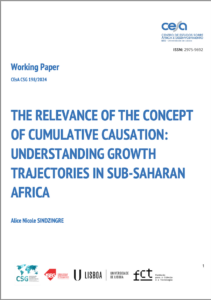Working Paper CEsA no. 198/2024 sheds light on the concept of cumulative causation and its relevance for explaining economic growth trajectories in Sub-Saharan Africa

CEsA has published the Working Paper no 198/2024, entitled “The Relevance of the Concept of Cumulative Causation: Understanding growth trajectories in Sub-Saharan Africa”, in English, authored by Alice Nicole Sindzingre. Professor Sindzingre is a CEsA researcher, Research Associate at the CEPN (Paris-North Economics Centre, University Paris-North, France), and at the LAM Research Centre (‘Africas in the World’, National Centre for Scientific Research/CNRS-SciencesPo-Bordeaux, France).
This Working Paper sheds light on the concept of cumulative causation and its relevance for explaining economic growth trajectories in Sub-Saharan Africa. Firstly, it empirically discusses the possibility of divergence between regions and countries, as well as the related theoretical debates. Secondly, it questions the mainstream explanations of growth trajectories: notably the limitations stemming from the pre-eminence of the conceptual framework of equilibrium, as well as the limitations of modelling in the apprehending of causation and consideration of other social sciences. Then it presents the concept of cumulative causation. Finally, it shows the relevance of this concept for the explanation of growth trajectories via the stylised examples of Sub-Saharan Africa vs. East Asian economies.
Click here to access the Working Paper no 198/2024.
Abstract:
 Differences in growth trajectories among countries – including the possibility of divergence –, are a central issue in economics. Mainstream economics explain growth processes via varieties of neoclassical models, even improved with concepts such as institutions. Yet such models have difficulties in providing accurate accounts of the growth trajectories of many developing countries, notably low-income ones. It is argued that the growth paths of low-income countries are more appropriately explained by the theoretical framework that relies on the nexus of concepts of cumulative causation, non-linearities, threshold effects, self-reinforcing processes, irreversibility, path dependence and traps – though this approach remains marginal in mainstream economic analyses of growth and development. Firstly, this nexus of concepts is a powerful framework concerning the possibility and explanation of dynamic divergence regarding growth between countries, as it exhibits properties such as: the possibility of cumulative, dynamically self-reinforcing, processes; the existence of thresholds and tipping points; multiple equilibria. Secondly, cumulative causation, by definition, involves a combination of causes: its conceptual framework allows for the integration of several dimensions – economic, political, social, cognitive –, whose combination results in either virtuous or vicious circles. In developing countries, these causes (and their coalescence) typically consist in economic structures (e.g., commodity-based export markets), political institutions and social norms (predatory regimes, high inequality) as well as types of public policies.
Differences in growth trajectories among countries – including the possibility of divergence –, are a central issue in economics. Mainstream economics explain growth processes via varieties of neoclassical models, even improved with concepts such as institutions. Yet such models have difficulties in providing accurate accounts of the growth trajectories of many developing countries, notably low-income ones. It is argued that the growth paths of low-income countries are more appropriately explained by the theoretical framework that relies on the nexus of concepts of cumulative causation, non-linearities, threshold effects, self-reinforcing processes, irreversibility, path dependence and traps – though this approach remains marginal in mainstream economic analyses of growth and development. Firstly, this nexus of concepts is a powerful framework concerning the possibility and explanation of dynamic divergence regarding growth between countries, as it exhibits properties such as: the possibility of cumulative, dynamically self-reinforcing, processes; the existence of thresholds and tipping points; multiple equilibria. Secondly, cumulative causation, by definition, involves a combination of causes: its conceptual framework allows for the integration of several dimensions – economic, political, social, cognitive –, whose combination results in either virtuous or vicious circles. In developing countries, these causes (and their coalescence) typically consist in economic structures (e.g., commodity-based export markets), political institutions and social norms (predatory regimes, high inequality) as well as types of public policies.
About the author:

Alice Nicole Sindzingre is reseacher at CEsA, and Research Associate at the CEPN (Paris-North Economics Centre, University Paris-North, France), and at the LAM Research Centre (‘Africas in the World’, National Centre for Scientific Research/CNRS-SciencesPo-Bordeaux, France). She taught in 2008-2010 at SciencesPo-Paris and in 2010-2014 in the department of economics of the University Paris-Nanterre. In 2005-2008, she wrote the monthly column on the theories of economic development in the French newspaper Le Monde. She has been a member of the Core Team of the World Bank World Development Report 2000-1 on poverty. She has conducted research on development economics and political economy as well as fieldwork in Sub-Saharan Africa (mainly in West Africa). She has published a great number of articles in academic journals and edited books on a large range of topics, including international trade, regional integration, foreign aid, China-Africa relationships, poverty traps, the theory of institutions, and the epistemology of economics.
Click here and get to know all the Working Paper Collection of CEsA
Author: CEsA Communications (comunicacao@cesa.iseg.ulisboa.pt)
Images: CEsA/Reproduction





